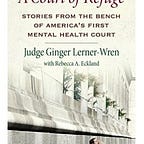Reflections for The New Year: Lessons from America’s First Mental Health Court Revisited
“Rejecting stigma in favor of equality and human dignity is the essence of social justice”- Judge Ginger Lerner-Wren
Updated December 26, 2020.
It has been over 23 years since Broward County launched America’s first problem-solving mental health court dedicated to the decriminalization of persons with serious mental illness and neuro-diverse disorders. As I reflect on the new year, I want to honor all mental health consumers and advocates working to advance change and social justice. I view with optimism the positive lessons I learned in terms of justice innovation, mental health recovery, and the power of community to collaborate in response to crisis.
The Power of Dignity: When Broward County began its problem-solving court in 1997, we anticipated it would be successful. If nothing else, the court would take aim at dispelling stigma, target trauma, and work to restore personhood. The first and vital lesson is that dignity and respect is its own force. Dignity dispels fear and levels the playing field. Ultimately, the promotion of dignity becomes a reflection of the integrity of the court process, the protection of legal rights, and the promotion of human rights.
The Value of Listening: The theory of therapeutic jurisprudence is built upon the principles of procedural justice. Meaning, if a court experience is to be perceived as fair and positive no matter the outcome, a court participant’s experience should include the belief that his/her voice is heard. It requires a non-judgmental way of receiving information and communicating. If a judge is sincere about humanizing justice, then soft skills, such as humility, empathy, and a willingness to acknowledge the strengths of others must be mastered and applied. The value of heartfelt listening is deep and transformative. It drives trust, enhances intuitive thinking, and ultimately improves complex decision-making. Listening is a core element of problem-solving justice.
Laughter Heals: Over the years our court team has laughed a lot. It is often the unexpected and profound comments that court participants share. Their gratitude for the court process and ways in which that is expressed and demonstrated is at times surprisingly humorous and inspiring. The lesson: that even amid great challenge, laughter can be magical. It heals and binds the human experience. In those moments, it also reminds us how fortunate we are to do this work.
Hope is Tangible: So many families come to court in extreme despair, fear, and frustration. Bridges have been burned, trust violated, and relationships broken. Family members often do not believe there is hope for loved ones with serious mental illness and substance disorders. Largely due to stigma, shame and battling complex barriers to care. The lesson is that hope is more than a concept or a feeling. It brings the future into the now and in that moment — life can begin again.
Peer Support, Supportive Housing and Supportive Services are Essential: Since the inception of the court peer support services, an array of evidence-based supports (e.g., first episode teams, peer operated drop-in centers, vocational training programs, and supportive housing) have been critical to guide engagement in care, and model recovery. That is, our dedicated mental health and substance use collaborative persevered. In a state without Medicaid Expansion coverage, this sustained the court’s mission, and now more urgent in response to the COVID-19 pandemic.
Recovery is Real: One of the greatest lessons of Broward’s Mental Health Court is that treatment works. That true recovery is possible if a person is linked to proper treatment, care and supports, and who is willing to commit to recovery and wellness. Together, working in partnership, our court team has witnessed tens of thousands of people affected by mental health conditions and other medical, social, and economic needs. Court participants embrace their lives and dreams.
Treating Mental Health as Health. This past year, the tensions surrounding community policing and crisis response for persons with mental illness became more pronounced with the deaths of Daniel Prude, Walter Wallace Jr., Ricardo Munoz, Stacy Kenny, and others. I have written many times about the urgent need to cross the criminal justice chasm from a health care perspective, and treat a mental health crisis as a medical crisis (see also Human Rights Watch.) Perhaps the collective voices of mental health and disability rights advocates will finally lead to a new vision for mental health in America.
